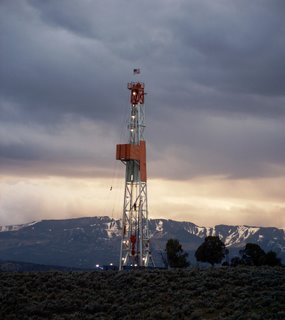"You Cannot Make Regulations too Stringent"
Residents of Garfield County, the epicenter of Colorado's latest oil and gas boom, came before the Air Quality Control Commission in Denver last Friday and Saturday with one clear and compelling message: we need stronger rules to protect us from the oil and gas industry's rising air pollution. The Air Quality Control Commission is now slated to decide whether or not to adopt stronger clean air rules this December 17th.
Garfield County is the epicenter of Colorado's latest boom. Over 3,000 oil and gas wells have been drilled, with thousands more projected. Most of these wells are centered in the Colorado River Valley, where the towns of Silt, Rifle, Parachute, and other communities are located. The oil and gas industry can drill wells where it wants, even on private property and without landowner permission. Many residents now have wells being drilled or producing near their homes.
When it comes to air pollution, oil and gas is king, especially in Garfield County. Oil and gas developments release 77% of all human-made toxic smog forming compounds in Garfield County, more than all the cars, trucks, and factories combined. This pollution is not only contributing to rising smog levels in western Colorado, but poses serious health risks. One of the smog forming compounds released by oil and gas includes benzene, which can cause leukemia.
The health of Garfield County residents is squarely at risk. As Tim Trulove testified, "We've had doctors tell both of us that our health is is to the state where we have to leave or die."
 To address this, the Colorado Air Pollution Control Division asked the Air Quality Control Commission to adopt a rule that would limit emissions of toxic smog forming compounds from oil and gas developments. The proposed rule would require condensate tanks that emit 20 tons/year or more to reduce emissions by 95%.
To address this, the Colorado Air Pollution Control Division asked the Air Quality Control Commission to adopt a rule that would limit emissions of toxic smog forming compounds from oil and gas developments. The proposed rule would require condensate tanks that emit 20 tons/year or more to reduce emissions by 95%.Many local governments, organizations, and citizens throughout Colorado, however, asked the Commission to adopt a stronger rule that would require pollution reductions from condensate tanks that emit 11 tons/year or more. Such a requirement is being proposed for the Denver metro area.
We won't know until December 17th whether the Commission will adopt a stronger rule, but the message is loud and clear. Booming oil and gas drilling needs to be tempered with effective clean air regulations that clear our skies and protect our communities. Hopefully the Air Quality Control Commission will adopt a stronger statewide rule to reduce air pollution from oil and gas.


0 Comments:
Post a Comment
<< Home